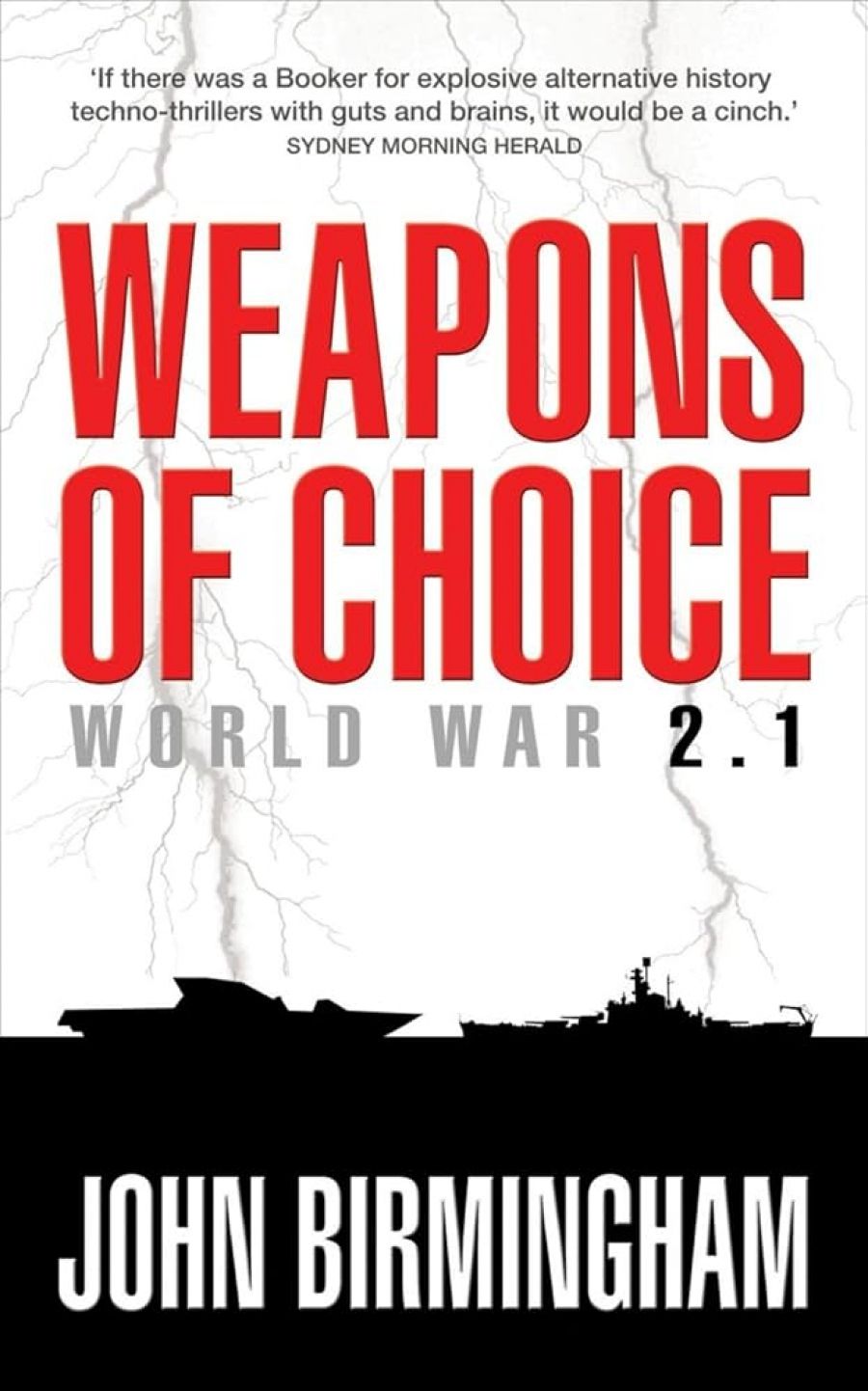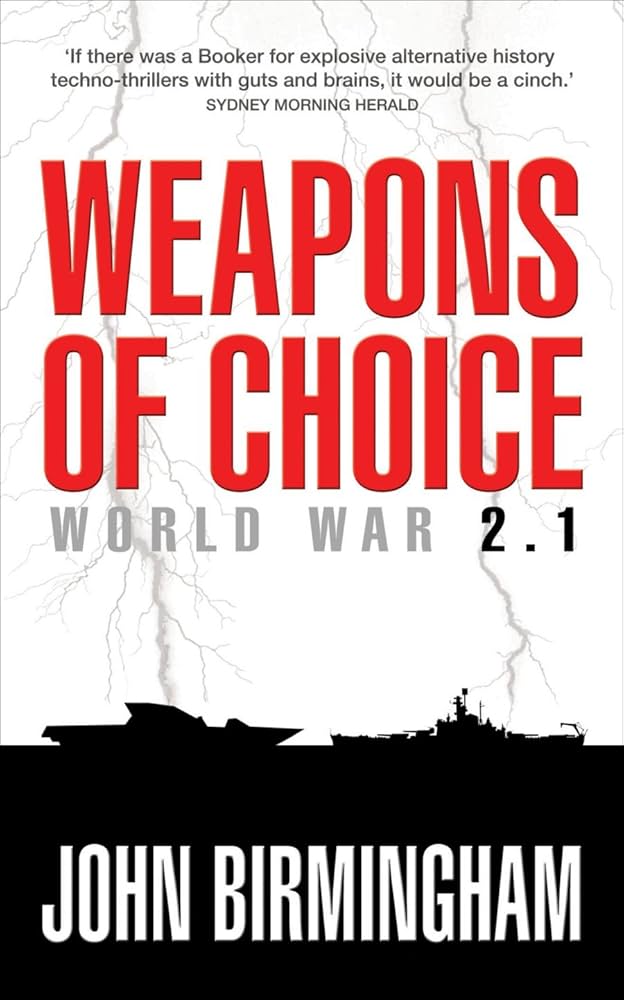
- Free Article: No
- Contents Category: Fiction
- Review Article: Yes
- Article Title: Critic-proof
- Online Only: No
- Custom Highlight Text:
One of the most outlandish Hollywood action films, relatively speaking, is The Final Countdown (1980), in which the nuclear-powered US aircraft carrier U.S.S. Nimitz is enveloped in a bizarre electrical storm in the Pacific and transported back in time to 1941, conveniently just before the Japanese attack on Pearl Harbour. The ship’s commander is played by Kirk Douglas, with Martin Sheen in the role of an enigmatic civilian who just happens to be on board. One memorable exchange between the two Hollywood heavyweights occurs just after the crew has realised that something strange has happened. Douglas muses that it could all be a Russian plot, perhaps involving parapsychology. ‘Excuse me, Captain,’ interjects Sheen with an impeccably straight face, ‘we also have to consider one alternative possibility: the possibility that what is happening here is real.’
- Book 1 Title: Weapons of Choice
- Book 1 Subtitle: World War 2.1
- Book 1 Biblio: Macmillan, $30 pb, 520 pp
- Book 1 Cover Small (400 x 600):

- Book 1 Cover (800 x 1200):

The narrative begins in East Timor, territory that Birmingham essayed in non-fiction in the topical and hard-hitting Appeasing Jakarta: Australia’s Complicity in the East Timor Tragedy (2001). In Weapons of Choice, the year is 2021, which means that all bets are off. The future, it seems, is very much like the present, only more so, while the people of the past are like us, only more backward. The US fleet of the near future finds itself sent back to the war in the Pacific, and materialises just before the Battle of Midway. How will 1942 cope not only with the technology of 2021 but with its more advanced attitudes to such issues as gender and race? If you think this is a scenario worth pursuing in a 520-page novel, the first in a proposed trilogy, then this book is for you.
A self-styled iconoclast, Birmingham has had a fair bit to say about the novel prior to publication. Naturally this paratext – to use the technical term coined by Gerard Genette for all the ancillary texts that cluster around a particular book, such as publicity bumph, cover blurb, author interviews etc. – influences the reception of the book in the same way that product advertising builds brands. In June 2004 Birmingham appeared in Good Weekend posing in a bathtub with miniature ships of the kind that also feature on the front cover of the novel. In the accompanying article, entitled ‘Every Big Boy’s Dream’, Birmingham discusses the counterfactual in fiction, and describes the genesis of what eventually was to become, in his words, ‘a Tom Clancy novel for lentileating Mike Moore fans’. Apparently great care went into nurturing what Birmingham, on an earlier occasion (in an interview published in The Age in August 2003) referred to as ‘the dumbest alternate history book ever’.
Neither Clancy nor Moore – each of whom is in close touch with his own inner child and that of his respective readership – is an ideal model for the best of this kind of writing, and certainly not in combination. Clancy’s obsession with military hardware is replicated to the nth degree in Weapons of Choice, as is Moore’s cartoon political correctness. Thus we have among the US fleet the ‘USS Hilary Clinton, a George Bush class supercarrier’. (Birmingham attempts one or two literary in-jokes: one of the non-US ships is the ‘Dessaix. Sartre-class stealth destroyer of the French navy.’)
In January 2004 Birmingham attacked Australian book reviewers in the Weekend Australian for, among other things, their alleged condescension towards writers of popular fiction. For its part, Weapons of Choice is by its nature well nigh critic-proof, as are other ephemeral cultural phenomena such as heavy-metal music or ballroom dancing, which are so inherently absurd and contrived that they operate outside the scope of serious music or dance criticism.
Against what standard can Birmingham’s novel reasonably be judged? Perhaps the best example of the counterfactual novel’s possibilities is The Difference Engine (1990), by William Gibson and Bruce Sterling, a novel that posits a world in which Charles Babbage has in fact invented the computer in Victorian London more than a century before the microchip. Intellectually, Birmingham’s book is not in the same league as this one, nor does he approach Robert Harris’s Fatherland (1992), which depicts Berlin in the days after the Axis wins World War II.
These writers, and past masters such as Jules Verne, bring to the counterfactual a style, atmosphere and moral seriousness that is absent from Weapons of Choice. Even the ridiculous but guiltily pleasurable film Wild Wild West (1999), in which a Confederate evil genius madman plans to win the American Civil War with secret super weapons powered by steam and magnetism, outdoes Birmingham for sheer jeu d’espirit.
The author note states that before becoming a writer, Birmingham worked as ‘a research officer with the Defence Department’s Office of Special Clearances and Records’. When faced with such a fanciful tale, of what relevance is this particular piece of paratext? Brian Aldiss once wrote that science fiction ‘is no more written for scientists than ghost stories are written for ghosts’. The same is surely true for novels such as Weapons of Choice, though apparently Birmingham and/or his publishers do want the intended readership to consider the possibility that what is happening here is real.


Comments powered by CComment